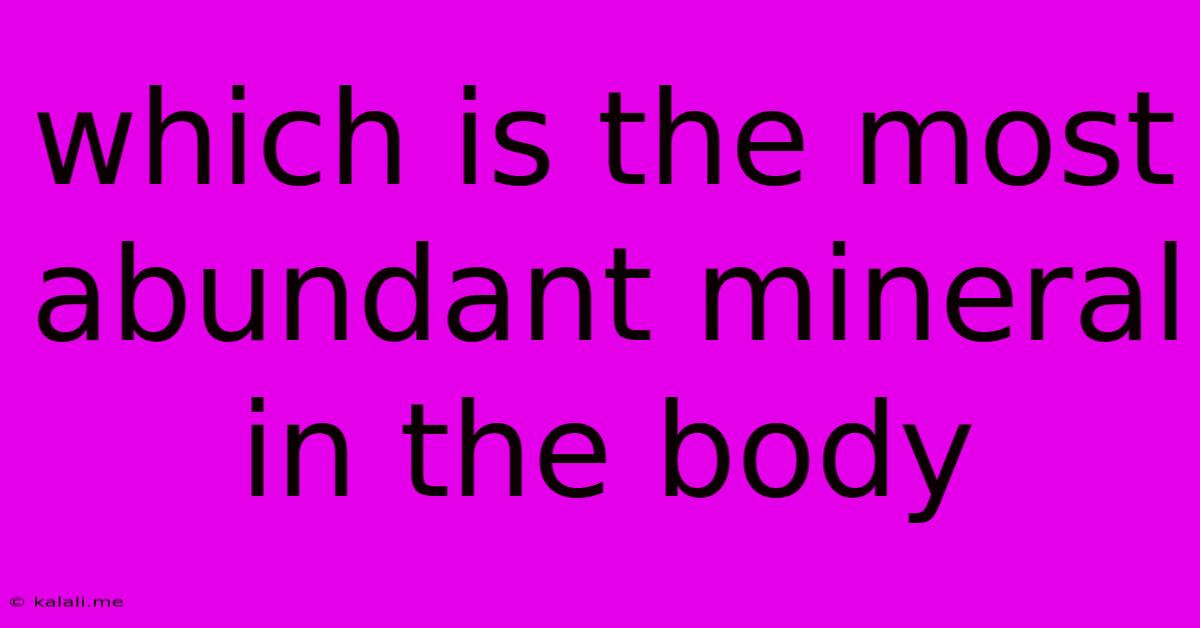Which Is The Most Abundant Mineral In The Body
Kalali
Jun 15, 2025 · 3 min read

Table of Contents
Which is the Most Abundant Mineral in the Body? Unlocking the Secrets of Calcium
What's the most abundant mineral keeping your body strong and functioning? The answer might surprise you, even if you suspect it's a crucial element for bone health. This article delves into the world of minerals, focusing on the champion: calcium. We'll explore its vital role, how much you need, and the consequences of deficiency.
Calcium: The Unsung Hero of Mineral Abundance
While many essential minerals contribute to our overall well-being, calcium reigns supreme as the most plentiful mineral in the human body. It's not just about strong bones; calcium plays a multifaceted role in various bodily functions. Understanding its importance is key to maintaining optimal health.
The Crucial Roles of Calcium
Calcium's functions extend far beyond skeletal structure. It's a critical player in:
-
Bone and Tooth Development and Maintenance: This is its most well-known role. Calcium forms the building blocks of our bones and teeth, providing strength and structural integrity. Adequate intake is crucial throughout life, especially during childhood and adolescence when bones are actively growing.
-
Muscle Contraction and Relaxation: Calcium is essential for the proper functioning of muscles, enabling movement and controlling muscle tone. Without sufficient calcium, muscle spasms and weakness can occur.
-
Nerve Impulse Transmission: Calcium ions play a vital role in nerve signal transmission, ensuring that messages are relayed efficiently throughout the nervous system. This is crucial for various bodily functions, including reflexes and coordination.
-
Blood Clotting: Calcium acts as a cofactor in the blood clotting process, helping to stop bleeding and prevent excessive blood loss.
-
Hormone Regulation: Calcium influences the secretion and function of several hormones, impacting various metabolic processes.
-
Cellular Function: Calcium is a key regulator of cell function, participating in various intracellular processes.
Calcium Deficiency: Recognizing the Warning Signs
A deficiency in calcium, known as hypocalcemia, can lead to a range of health issues, including:
- Osteoporosis and Osteopenia: These conditions characterize weakened bones, increasing the risk of fractures.
- Muscle cramps and spasms: Insufficient calcium can disrupt muscle function, leading to painful cramps.
- Numbness and tingling: Nerve function can be impaired, resulting in sensations of numbness or tingling in the extremities.
- Increased risk of cardiovascular disease: Emerging research suggests a link between calcium deficiency and cardiovascular problems.
How Much Calcium Do You Need?
The recommended daily allowance of calcium varies depending on age, sex, and other factors. It's essential to consult with a healthcare professional or registered dietitian to determine your individual needs. Dietary sources rich in calcium include dairy products (milk, yogurt, cheese), leafy green vegetables (kale, spinach), fortified foods (cereals, juices), and almonds.
Conclusion: Prioritizing Calcium Intake
Calcium's abundance in the body reflects its irreplaceable role in maintaining health and well-being. Ensuring adequate calcium intake through a balanced diet and, if necessary, supplementation, is essential for preventing deficiencies and supporting overall health throughout life. Remember to consult with a healthcare professional for personalized advice on calcium intake and overall dietary needs. Pay attention to your body's signals, and don't hesitate to seek professional guidance if you suspect a calcium deficiency.
Latest Posts
Latest Posts
-
Which Of The Following Is A Physiological Adaptation
Jun 16, 2025
-
Which Of The Following Is Not A Homogeneous Mixture
Jun 16, 2025
-
What Number Is 30 Of 140
Jun 16, 2025
-
Full Form Of G A I L
Jun 16, 2025
-
First General Purpose Electronic Digital Computer
Jun 16, 2025
Related Post
Thank you for visiting our website which covers about Which Is The Most Abundant Mineral In The Body . We hope the information provided has been useful to you. Feel free to contact us if you have any questions or need further assistance. See you next time and don't miss to bookmark.